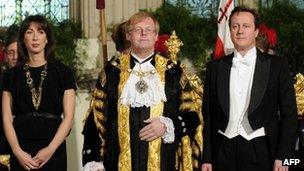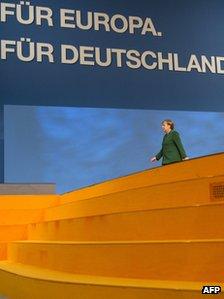Tension over 'Europe' rises between UK and Germany
- Published
- comments

The British prime minister questioned "grand plans and utopian visions" for Europe
As the eurozone crisis defies resolution, so the tension rises between Europe's leaders.
President Sarkozy and David Cameron have argued, so have the French leader and the German Chancellor. Now there is tension between the UK and Germany.
Tomorrow David Cameron flies to Berlin to meet Angela Merkel. Previously they have got on well and they should be natural political allies. But the issue of 'Europe' has got in the way, as it has in the past.
This week they paraded very different visions for Europe.
Division over vision
Speaking at her party conference in Leipzig, Angela Merkel said, "The task of our generation is to complete economic and monetary union, and build political union in Europe, step by step... that does not mean less Europe, it means more Europe."
A short while later David Cameron, speaking at the London Lord Mayor's banquet spoke of "we sceptics" being right to question "grand plans and utopian visions". His vision was of a Europe operating with the "flexibility of a network".
The atmosphere between the two countries was not eased by the comments of two German MPs.

Angela Merkel put 'more Europe' at the heart of her message.
Volker Kauder accused Britain of being too self-centred in its relationship with Europe.
"Just looking for their own advantage and not being prepared to contribute - that cannot be the message we accept from the British," he said.
Then Michael Meister, the deputy leader of the Christian Democrats in parliament, warned Britain against catering to nationalist sentiment over the euro.
"I'm baffled," he said, "that in Great Britain there doesn't seem to be a clear view of the consequences a collapse of the euro would have on the city of London. He seems to have missed the repeated notes of alarm coming out of London about the dangers from the crisis."
Irritation
Certainly there is irritation at what the Germans see as British criticism of the handling of the euro-zone crisis.
It got under President Sarkozy's skin and it irritated the French paper Le Monde this week which urged Britain to "shut up".
A senior diplomat with knowledge of the relations between the two countries told me that the differences were significant but should not be over-stated. There is not a rift but there is tension.
Both in Paris and Berlin they are infuriated with some of the British press comment.
The Germans are not that impressed by the UK economy either. They believe the UK made a strategic error by relying so heavily on financial services while allowing the manufacturing sector to shrink.
A widely held view in German government circles is that they are in no position to lecture anyone.
The UK government insists it has a big interest in resolving the eurozone crisis. Ministers believe that the UK will be seriously damaged if the euro collapses.
Reform incentive
The British, like the French, want the European Central Bank to act as a lender of last resort.
Chancellor Merkel, for the moment, will not accept that. She thinks it would be against EU treaties and her closest advisers say that it would result in printing money and stoking inflation.
It would also remove the incentive on Greece and Italy to reform themselves.
Yesterday President Sarkozy said, "If the ECB does not enter squarely into the fray, there will one day be no euro at all."
The British share that view.
The other major area of tension is over influence. Angela Merkel wants a much more tightly-integrated eurozone.
The fear in Britain is that this will lead to a two-tier Europe with the UK in the outer ring. For David Cameron remaining at the top table when key decisions are taken on the single market or the financial sector is a British national interest.
In more recent comments the Chancellor has stressed that the EU is a union of 27 members. David Cameron will be seeking further reassurances.
According to diplomats, the Germans would like to see Britain doing more to help the EU in its hour of need. There is frustration that the UK won't do more.
The British point out that they are the fourth biggest contributor to the IMF - which contributes almost one-third to EU bail-outs - they have given bilateral help to Ireland and supported Greece through the contribution to the EFSM.
Tax 'bullet'
Another source of irritation is the financial transaction tax. The Germans want it. They see it as raising valuable funds.
British Chancellor of the Exchequer George Osborne said such a tax would be "a bullet aimed at the heart of the city". In UK government circles there is a belief that France and Germany are trying to weaken the City of London. That is a source of tension.
Over the tax, however, the UK has allies.
When the two leaders meet, there is unlikely to be a major row. Neither leader wants it. Angela Merkel has today tried to reach out to the UK, praising its austerity programme.
The relationship between David Cameron and Angela Merkel is probably more natural than that between the British Prime Minister and the French President.
But the eurozone crisis and the risk of recession in Europe is bringing tension to the surface and very different visions of Europe.